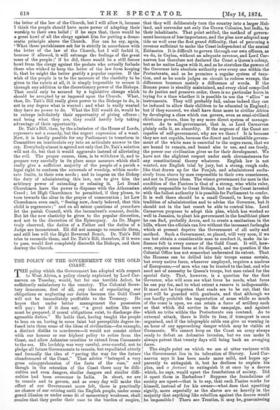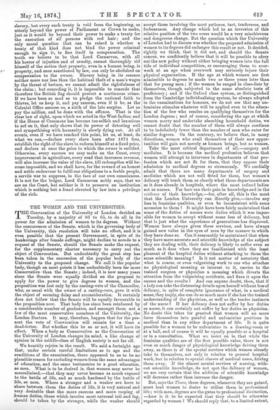THE POLICY OF THE GOVERNMENT ON THE GOLD COAST.
THE policy which the Government has adopted with respect to West Africa, a policy clearly explained by Lord Car- narvon on Tuesday, would, but for one terrible defect, be sufficiently satisfactory to the country. The Colonial Secre- tary denounces, first of all, any idea of repudiating our obligations or neglecting our duties because the Gold Coast will not be immediately profitable to the Treasury. He hopes that under better management the possession will pay ; but if it does not, "a great nation like ours must be prepared, if moral obligations exist, to discharge dis- agreeable duties." He holds that, having taught the people to lean on us, having in some faint but perceptible degree in- fused into them some of the ideas of civilisation—for example, a distinct dislike to murderers—it would not consist either with our honour or our highest policy to retire from the Coast, and allow Ashantee cruelties to extend from Coomassie to the sea. His lordship was very careful, over-careful, not to pledge all future Governments to remain, but repudiated utterly and formally the idea of "paving the way for the future abandonment of the Coast." That advice "betrayed a very gross misapprehension of the facts of the case," and though in the retention of the Coast there may be diffi- culties and even dangers, similar dangers and similar diffi-
culties had been overcome in India. In short, we are to remain and to govern, and as every day will make the effect of our Government more felt, there is practically no chance of our retiring until the English people, under some grand illusion or under some fit of momentary weakness, shall resolve that they prefer their ease to the burden of empire, that they will deliberately turn the country into a larger Hol- land, and surrender not only the Crown Colonies, but India, to their inhabitants. That point settled, the method of govern- ment becomes of less importance, and the plan now adopted may tide us well over the first grand difficulty, that of procuring a revenue sufficient to make the Coast independent of the annual Estimates. It is difficult to govern through our own officers, as we do, in Ceylon, without an adequate revenue, and Lord Car- narvon has therefore not declared the Coast a Queen's colony, but as he unites Lagos with it, and as he stretches the powers of the Governor into absolute authority over every one within the Protectorate, and as he promises a regular system of taxa- tion, and as he sends judges on circuit to redress wrongs, the difference becomes mainly a difference of words. If the Roman peace is steadily maintained, and every chief compelled to do justice and preserve order, there is no particular harm in trying for a time whether it is possible to use the "allies " as instruments. They will probably fail, unless indeed they can be induced to allow their children to be educated in England ; but if they succeed, we shall have done more to civilise Africa by developing a class which can govern, even as semi-civilised chieftains govern, than by any more direct system of manage- ment. As to self-government, that is, as Lord Carnarvon plainly calls it, an absurdity. If the negroes of the Coast are capable of self-government, why are we there ? It is because they are not capable, because the direct and irresistible govern- ment of the white man is essential to the negro races, that we are bound to remain, and bound also to use, and use freely, the power our civilisation gives us for their development. We have not the slightest respect under such circumstances for any constitutional theory whatever. English law is not wanted, nor English trial by jury, but a strong, rough code, like that drawn up for the Punjab, and administered exclu- sively from above by men responsible to their own consciences, and not to Fantee ideas. The wisest government for men in the condition of the Fantees is that of a strong, wise white ruler, strictly responsible to Great Britain, but on the Coast invested with the fullest authority it is possible for Parliament to confer. It is well there should be a small Council, to keep up the tradition of administration and to advise the Governor, but it should not in the last resort be able to control him. Lord Carnarvon proposes to adopt this plan, which has worked so well in Jamaica, to plant his government in the healthiest place he can find, probably Accra, and to create a sanitarium in the hills, where the officials can live without the incessant furloughs which at present deprive the Government of all unity and method. Such a Government, so placed, will very soon, if we can but obtain a considerable man to conduct it, make its in- fluence felt in every corner of the Gold Coast. It will, how- ever, require some force at its disposal, and we question if the Colonial Office has not somewhat underrated its extent. That the Houssas can be drilled into fair troops seems certain, but every native force, wherever employed, requires a nucleus of Europeans,—of men who can be trusted to the last, and who need not of necessity be Queen's troops, but men raised for the special duty. That, however, is a question for the first Governor, who will soon see what force he needs, what force he can pay for, and to what extent a reserve is indispensable. It must not be forgotten that roads are to be cut, that the port will be guarded with gunboats, and that although we can hardly prohibit the importation of arms while so much of the coast is open, we can retain a force of artillery such as that which did service in the campaign, and against which no tribe within the Protectorate can contend. As to external attack, there is little to fear, if transport is once organised, and if the telegraphic cable can give us warning in an hour of any approaching danger which may be visible at Coomassie. We cannot keep on the Coast an army always ready to defeat an Ashantee invasion, but we can make it always patent that twenty days will bring back an avenging force.
The single point on which we are at utter variance with the Government lies in its toleration of Slavery. Lord Car- narvon says it has been made more mild, and hopes ap- parently to extinguish it, but he declines to explain his plan, and a fortiori to extinguish it at once by a decree which, he says, would upset the foundations of society. Did it upset them in Barbadoes ? Suppose the foundations of society are upset—that is to say, that each Fantee works for himself, instead of for his owner—what does that upsetting signify, more especially as the slaves are so heavily in the majority that anything like rebellion against the decree would be impossible ? There are Treaties, it may be, guaranteeing
slavery, but every such treaty is void from the beginning, as utterly beyond the power of Parliament or Crown to make, just as it would be beyond their power to make a treaty for the execution of all persons with red hair ; and the only moral question that can be raised is whether a treaty of that kind does not bind the power criminal enough to sign it, to fine itself in compensation. The truth we believe to be that Lord Carnarvon, with all his horror of injustice and of cruelty, cannot thoroughly rid himself of the notion that property, even in a human being, is property, and. once sanctioned by law, can only be abolished on compensation to the owner. Slavery being in its essence neither more nor less than the habitual theft of a man's wages hy the threat of torture, we cannot admit the rightfulness of the claim ; but conceding it, it is impossible to concede that therefore the British flag should protect a continuous crime. If we have been so mad as to pledge the national faith to thieves, let us keep it, and pay ransom, even if it be, as the Colonial Office assures us, a sixth of the late surplus. Let us pay the million, and be done with the offence. That is the clear law of right, upon which we acted in the West Indies; and if the House of-Commons has become too selfish and luxurious to ad on it, that only shows that its power of detesting evil and sympathising with humanity is slowly dying out. At all events, even if we have reached this point, let us, at least, do what we can,—declare every slave born after 1874 free, establish the right of the slave to redeem himself at a fixed price, and declare at once the _price to which the owner is entitled. Otherwise, every success we may make on the Coast, every improvement in agriculture, every road that increases revenue, will also increase the value of the slave, till redemption will be- come impossible, and we shall have, for the reward of an honest and noble endeavour to fulfil our obligations to a feeble people, a servile war to suppress, in the face of our own consciences. It is not for the ledger, Lord Carnarvon nobly says, that we are on the Coast, but neither is it to preserve an institution which is nothing but a fraud elevated by law into a privilege -of the rich.



































 Previous page
Previous page